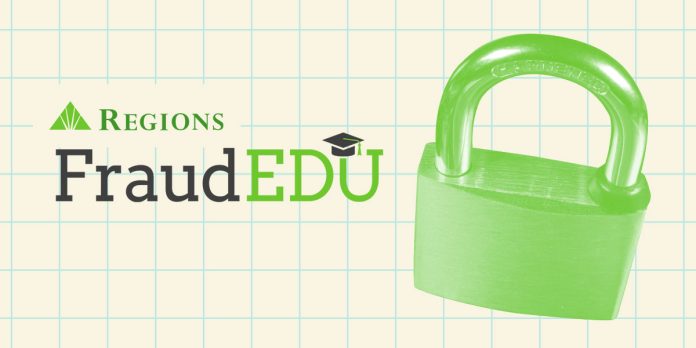It’s the season of holiday shopping, bustling stores, and long checkout lines. In lieu of the in-person chaos, many shoppers choose to purchase online, thinking it may be a calmer–and safer–option.
However, scammers are working overtime . And Regions Bank has some new tips and suggestions you may not have heard before. Keep reading to learn the latest.
“The trends we’re seeing online today are not always the same as they were a year ago, so it pays to take a moment and understand what we’re seeing right now,” said Jeff Taylor, head of Commercial Fraud Forensics at Regions Bank. “Our goal is to educate and inform so you can reduce your chances of falling victim.”
Practice Good Cybersecurity Hygiene
Getting bombarded by texts that look like they’re from a retailer you know? Seeing social media ads that look amazing, but they’re from an unknown seller? Be wary. Don’t click, Taylor said.
“Ads on social media, as well as phishing scams, try to persuade shoppers to click on links and give up personal information like your name, password, answers to security questions, and even your bank account number,” Taylor added. “Don’t fall for it. Go to a company’s legitimate website directly. In some cases, fake sites promoted online may cause you to unknowingly download malware to your device.”
Know Who You’re Buying From
Don’t just use a search engine to find the website of a store, a bank, or any other business. Scammers are known to purchase ads that put a false – but convincing-looking website – at the top of your search-engine results. You then think you’re using the legitimate company’s actual website, but it’s often a spoofed website just waiting for you to make a ‘purchase’ and enter your account information.
“Also, be on guard for any ‘company’ asking you to update your password or account information immediately, or pressuring you to act urgently to change your security settings,” Taylor said.
So, always check each website’s actual URL to make sure it’s legitimate and secure. A site you’re buying from should have “https” in the web address. And the URL should be the same as what the business advertises online. Even one letter being off could indicate a spoofed website. If anything looks off, don’t enter your information on that site.
Also, avoid clicking on links in emails or ads, even if they seem legitimate; instead, type the retailer’s URL directly into your browser.
If you’re purchasing from a company for the first time, do your research and check reviews to verify the legitimacy of a buyer or seller. If you’re using an online marketplace or auction website, check their feedback rating. Be wary of buyers and sellers with mostly unfavorable ratings or no ratings at all.
Avoid sellers who act as authorized dealers or factory representatives of popular items in countries where there would be no such deals. Be wary of sellers who post an auction or advertisement as if they reside in the U.S., then respond to questions by stating they are out of the country on business, family emergency or similar reasons.
Be Careful How You Pay
Be extremely cautious before wiring money to a seller. The same goes for the faster person-to-person payment channels. Be especially leery of requests to pay in strange methods, like cryptocurrency.
And walk away from requests to pay with prepaid gift cards. In the gift card scam, a seller will ask you to send them a gift card number and PIN. Instead of using that gift card for your payment, the scammer will steal the funds, and you’ll never receive your item.
Monitor the Shipping Process
Always get tracking numbers for items you buy, so you can make sure they have been shipped and can follow the delivery process.
If you get an urgent text message or an email about a delivery you weren’t expecting, do not click on the link. If you believe the delivery might be legitimate, contact the service or the seller through a verified phone number or website.
When selling items online, be suspicious of any credit card purchases where the address of the cardholder does not match the shipping address. Always receive the cardholder’s authorization before shipping any products.
Remember, if a deal seems too good to be true, it probably is.
Be safe, be vigilant, and have a merry shopping season!








